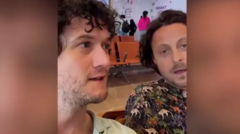The BBC has reiterated its commitment to journalistic integrity following accusations from Kenyan officials regarding its investigation into child sexual exploitation, asserting that the documentary highlights critical issues despite claims of fabrication.
BBC Stands Firm on Kenya Child Trafficking Investigation Amid Government Criticism

BBC Stands Firm on Kenya Child Trafficking Investigation Amid Government Criticism
The BBC defends its documentary exposing child-sex trafficking in Kenya after government officials label it a "hoax".
The BBC has defended its investigation into child sexual exploitation in Kenya after the government criticized the report as a "hoax." During a parliamentary session on Wednesday, Interior Minister Kipchumba Murkomen declared the documentary "fake," claiming the individuals interviewed were not minors but were posing as children.
The BBC rebutted this assertion, clarifying that the documentary highlighted adults sharing experiences of abuse from their childhood. The broadcaster emphasized that the Africa Eye investigation serves a crucial role in public interest journalism.
Mr. Murkomen also accused the BBC of offering financial incentives to those interviewed. The BBC firmly responded, stating that none of the participants were paid or influenced in any manner to tell their stories. The broadcaster further noted that evidence gathered during the investigation was submitted to Kenyan authorities in March, with follow-up actions taken to safeguard vulnerable children.
In defending the government’s stance, Mr. Murkomen indicated that Kenya takes child trafficking matters seriously. However, he faced backlash from the National Assembly Speaker Moses Wetang'ula, who argued that the purpose of the documentary was to tarnish Kenya's image.
The BBC's investigation, released on August 4, has reportedly accumulated over one million views on YouTube, detailing horrific accounts of underage girls, some as young as 13, trafficked for sex in Maai Mahiu, a town in Kenya’s Rift Valley. The documentary featured two women admitting to engaging in the illegal trafficking of minors for prostitution, acknowledging the normalization of the practice in the area.
The footage included disturbing admissions, such as one woman, Nyambura, who stated, "They're still children, so it's easy to manipulate them by just handing them sweets." The investigation identified both the victims in need of help and those perpetrating these crimes.
In response to the documentary, the Office of the Director of Public Prosecutions has tasked the Directorate of Criminal Investigations to pursue an inquiry into the reported trafficking. Notably, the BBC raised concerns that survivors interviewed were subjected to investigations without legal support, while the women implicated in the trafficking remain at large.
The situation highlights ongoing challenges in addressing child exploitation within Kenya, as accountability and protection efforts become increasingly critical.


















